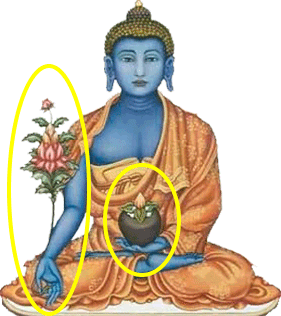Haritaki the oxygen champion
The supreme nectar that illuminates the mind
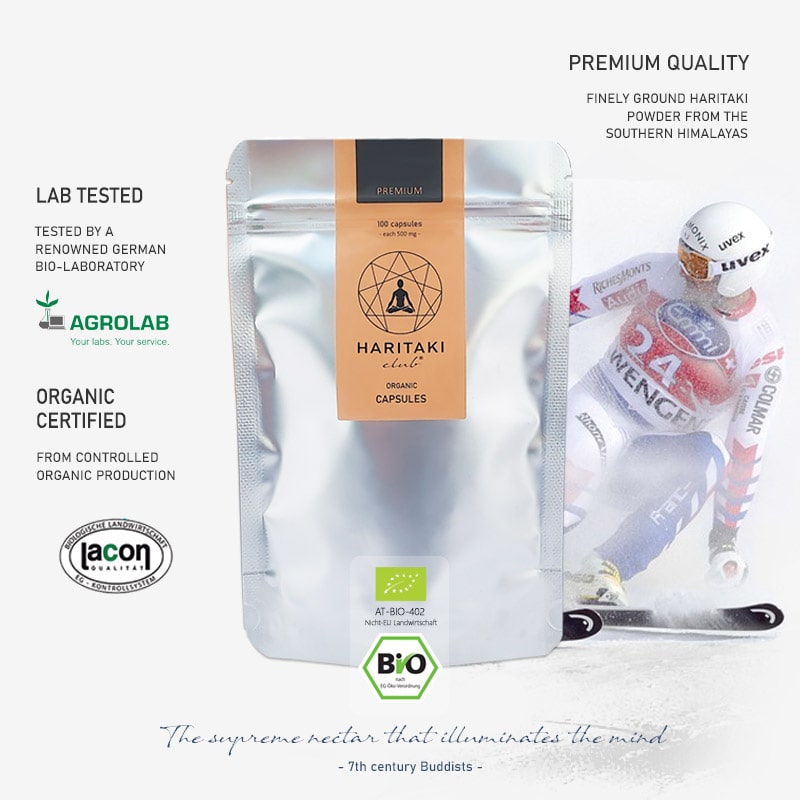
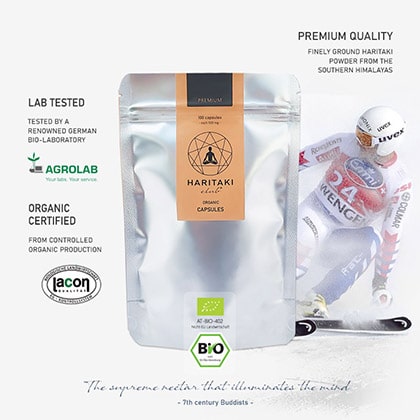
The supreme nectar that illuminates the mind
What does science say?
Clinical study
The role of Haritaki (Terminalia Chebula) in the treatment of anemia.
In a clinical study published in the "Journal of Research and Education in Indian Medicine", the effect of Haritaki (Terminalia Chebula) on hemoglobin levels was investigated in 45 anemia patients.In anemia, there is a deficiency of red blood pigment (hemoglobin) and/or red blood cells (erythrocytes) and thus an insufficient amount of blood cells (hematocrit) in the body.
The protein hemoglobin is the crucial factor in the transport of oxygen from the lungs to the organs and muscles, which is why care is taken, especially in elite sports, to ensure that hemoglobin levels are not too low, as this leads to a drop in performance.
Result: At the end of the thirty-day observation period, hemoglobin levels were again measured in all. Within the Haritaki group, it increased by an average of 17.96%, and in the group receiving Haritaki together with jaggery, it increased by 14.71%. In the control group (placebo), on the other hand, the hemoglobin level increased by only 1.22%.
For comparison: Thirty days of altitude training, above 2500 meters above sea level, can increase hemoglobin levels (depending on altitude) by about 4 to 8%.
The hemoglobin level
The physical endurance of top athletes depends directly on the amount of hemoglobin in their blood. This has been demonstrated by Prof. Dr. Walter Schmidt and PD Dr. Nicole Prommer at the Institute of Sports Science at the University of Bayreuth.Source: IDW Online
When the concentration of hemoglobin in the blood increases, the available blood gains a greater capacity to absorb and transport oxygen, making more oxygen available to the working muscle.Hemoglobin is an iron-storing protein in the red blood cells and enables the transport of oxygen in the blood. If the hemoglobin level in the blood is too low, one feels listless, tired and listless.
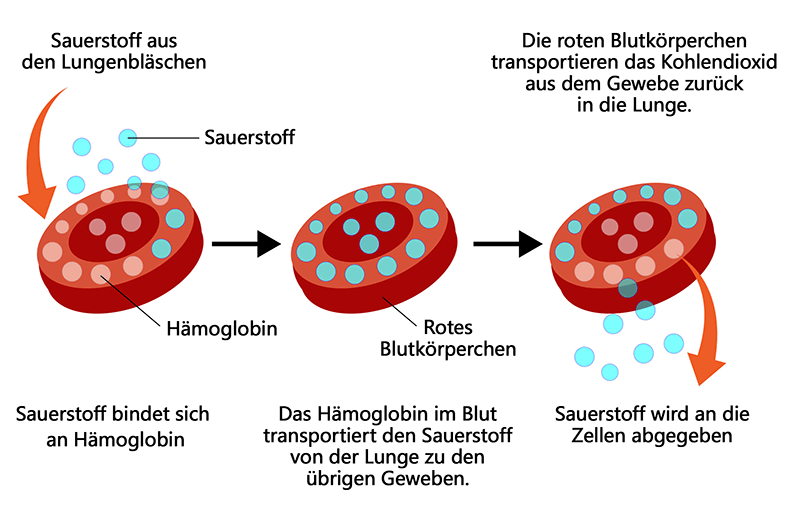
For this purpose, athletes and their physicians resort to a wide variety of methods (some of which are prohibited for reasons of sports and medical ethics), such as:
- Blood transfusion (forbidden in competitions)
- EPO intake (forbidden in competitions)
- High altitude training (allowed in competitions)
Quelle: Deximed
The oxygen tricks in top-level sport
In top-level sports, everything revolves around performance enhancement. This is achieved by improving the oxygen supply (usually by increasing the hemoglobin level in the blood). Athletes and their doctors try to achieve this in a wide variety of creative ways, because every percent increase in performance can make the difference. In recent decades, this form of performance enhancement has become a cat-and-mouse game between athletes their federations and the doping watchdogs.More oxygen through blood transfusion
One of the most effective methods to increase hemoglobin levels is so-called "blood doping". In this case, hemoglobin-rich blood is transported into the body by means of blood transfusion, which leads to a significant - and short-term - increase in performance.This method of performance enhancement has been officially banned in competitions since the 1988 Olympics; it is considered unethical.
A blood transfusion with foreign blood also carries certain health risks and is relatively easy to detect. Some athletes, however, have their own blood drawn a few weeks before a competition, enrich it with hemoglobin and inject it again shortly before the competition. The infusion of autologous blood (as opposed to foreign blood) is virtually undetectable, but nevertheless remains prohibited and does not comply with the ethical principles of the sport.More oxygen through erythropoietin (EPO)
EPO is an endogenous hormone produced in the kidney. It stimulates the formation of red blood cells (erythrocytes) in the stem cells of the bone marrow. Since 1983 it has been possible to produce EPO synthetically. Taking it causes an increase in the level of hemoglobin in the blood, thus increasing its oxygen-carrying capacity. This causes a considerable increase in endurance as well as performance, but like blood doping, is officially banned for ethical reasons.Since EPO is a hormone produced naturally in the body, and there is little difference between endogenous and synthetic EPO, it is difficult to detect EPO doping. The disadvantage of EPO is that if it is used more than once, it can lead to the formation of antibodies, which then inhibit the formation of new red blood cells. Many scientists assume that at least 50% of all cyclists use EPO, others even speak of 90%. The situation is similar for cross-country skiers, rowers and speed skaters.
More oxygen through high altitude training
High altitude training also ensures that the hemoglobin level in the blood is increased, it is a kind of natural "doping", in contrast to blood transfusion it is permitted and is considered ethically harmless.At altitudes above 2500 meters, the partial pressure of oxygen in the air is lower, i.e. the body is initially undersupplied with oxygen from the outside (hypoxia), and performance drops. Shortly thereafter, however, the body responds with a counterattack by increasing the production of red blood cells (these consist of 90% hemoglobin), the hemoglobin level begins to rise, allowing more oxygen to be transported.
Effect of high altitude training: A high altitude training leads per week to about 1% more hemoglobin in blood, after 4 weeks, the hemoglobin value can thus be increased by about 4%. This effect subsequently lasts about three to six weeks.More oxygen through Haritaki
In a clinical study published in the Journal of Research and Education in Indian Medicine, the effect of Haritaki on hemoglobin levels was studied in 45 anemia patients.Anemia
Anemia (also called "anemia") mostly means a lack of hemoglobin in the blood, which can be caused either by too few red blood cells or too little hemoglobin in the cells. Moderate anemia is manifested by symptoms such as fatigue, loss of appetite, weakness, shortness of breath and palpitations, especially during physical exertion, as well as pallor of the skin and mucous membranes.One group received 3 grams of Haritaki powder (Terminalia Chebula) in capsule form daily for 30 days, while another group was given only a placebo.
At the end of the thirty-day observation period, hemoglobin levels within the Haritaki group increased by an average of 17.96%, while the control group experienced an average increase in hemoglobin levels of only 1.22%.
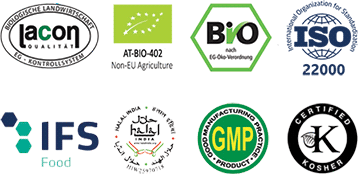
Our products
Our quality features
Our product is organic, vegan, laboratory tested, kosher, halal and certified according to IFS, EU Bio and ISO-standards.Laboratory tested by an independent body
Quality is our highest priority, therefore every batch is additionally microbiologically tested by an independent German laboratory.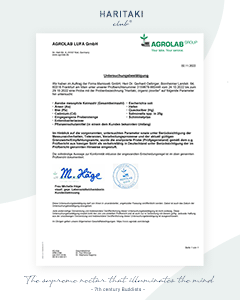
click to enlarge
Fully recyclable packaging
These provide the best protection against moisture, oxygen, and UV rays, making them the most suitable for Haritaki powder. By thermolaminating for airtight sealing, we avoid solvent-based adhesives, which are harmful to the environment.

Haritaki - the sacred fruit of Buddha
Haritaki is the fruit of the Haritaki tree, which grows up to 30 meters high and is native to Southeast Asia and India. Haritaki is revered in many places as "sacred", as already illustrated by the Sanskrit name "Haritaki", which translates as "He who comes from the house of God". Tibetan monks have been importing Haritaki for centuries - sometimes laboriously - from the southern Himalayan regions, as they consider it essential for their health and spiritual vitality.Haritaki: "The queen of all medicinal plants"
It is therefore not surprising that Haritaki was already in ancient times, in the oldest medical books in the world such as the "Materia Medica of Ayurveda", "An illustrated Tiebto-Mongolia materia" and the "Principles of Lamaist Pharma
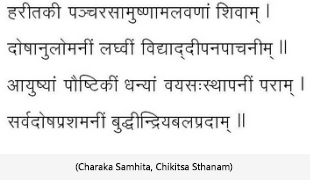
The power of Haritaki is recorded in "Chikitsa Sthana", the special therapy
Buddha himself, the monks tell us, had recommended the daily intake of Haritaki. Haritaki is also called the "Great Golden Fruit" in Buddhism.
